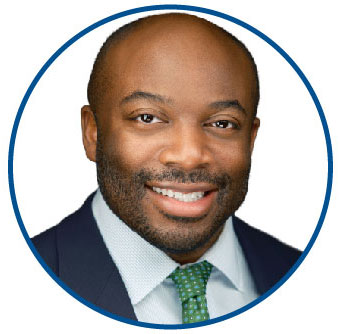Some healthcare professionals know their field of calling from a young age. That was not the case for Dr. Olufemi Ayeni.
“I initially thought about studying archeology – the bones of the dead,” says the Professor and Academic Division Head of Orthopaedic Surgery at McMaster University, as well as the Chief of Adult Surgery at McMaster University Medical Centre. “Eventually, it swung back to studying the bones in the living with orthopedic surgery.”
It was a change of course that’s proven beneficial for the many people living with arthritis who have been helped by Dr. Ayeni. With Arthritis Society Canada’s support, Dr. Ayeni plans to help many more through his next project, which could transform osteoarthritis treatment.
The REPAIR Trial: Revolutionizing therapy
Damaged cartilage in the hip can progress to osteoarthritis, so repairing it is important to prevent or delay the onset of arthritis. Traditionally, when someone with damaged cartilage in the hip is treated with surgery, a technique called microfracture is used to repair the joint. This involves drilling several holes, or micro fractures, into the cartilage to stimulate growth of new tissue. Often, the tissue formed in response to microfracture surgery isn’t as flexible or durable as normal cartilage, and there is also a risk of damaging the underlying bone through this procedure.
Dr. Ayeni’s REPAIR Trial takes a different approach. He and his colleagues are combining elements of a limited microfracture while also applying collagen on top of the damaged cartilage to promote cartilage tissue regeneration.
“The goal of this trial is to evaluate if this novel repair will grow better functioning and more normal-appearing cartilage than the microfracture procedure. The ultimate goal is to evaluate which procedure will prevent the onset of osteoarthritis,” Dr. Ayeni says.
Thirteen sites across Canada are getting involved in the first-of-its-kind randomized clinical trial, but Dr. Ayeni says the aim is to recruit centres in the U.K. and Germany, too. Participants are between 18 and 50 years of age with hip pain due to cartilage damage and early osteoarthritis. The plan is to complete the funded project in two to three years.
“In the best-case scenario, we find another viable treatment option to treat a wide range of patients with painful hips due to early arthritis and cartilage damage,” Dr. Ayeni says. “The long-term hope is that we can delay the need for more involved surgery, such as hip replacement or other treatments.”
A family calling
 Dr. Ayeni, who holds the Tier 2 Canada Research Chair in Joint Preservation Surgery, was inclined to study arthritis because members of his family live with osteoarthritis. He wanted to have answers for them if and when they asked about pain management, and he hoped to be able to discuss new treatment options.
Dr. Ayeni, who holds the Tier 2 Canada Research Chair in Joint Preservation Surgery, was inclined to study arthritis because members of his family live with osteoarthritis. He wanted to have answers for them if and when they asked about pain management, and he hoped to be able to discuss new treatment options.
“I was attracted to studying joint-preserving surgery and using novel surgical technology to try to prevent osteoarthritis or delay it as much as possible,” he says.
Dr. Ayeni moved from Montreal to Nigeria as a child, and then to Kapuskasing, a small town in northern Ontario. Throughout his travels, he saw the global impact on those limited by joint pain due to arthritis. He has fond memories of grateful patients stopping his surgeon father in grocery stores or the mall to say thanks. He and his siblings recognized how satisfying it was to have a job that people appreciated. Three of his four siblings chose the medical profession and work as surgeons, too.
From hospital to sporting fields and mentorship roles
Away from McMaster University Medical Centre, Dr. Ayeni is the Medical Director of both the Hamilton Tiger Cats CFL team and Hamilton’s Forge FC soccer team. Caring for athletes and getting them back in play as quickly as possible post-injury is his priority.
“Dealing with athletes is a wonderful experience. Athletes are people, after all, no different than you or I. They’re at a high level of play in their sport, but they have the same ambitions, wishes and fears,” Dr. Ayeni says. “That’s one of the great things I get out of it – the relationships.”
Footballs and soccer balls aside, Dr. Ayeni also finds time to give back. Through Notch Academy, an online program he launched in 2022, he mentors the next generation of surgeon-scientists, sharing insights and tips he’s learned over his career. It’s one more way for him to make an impact.
Reflecting on his own career and what motivates him, Dr. Ayeni points to the unknown.
“Almost every day, there will be a patient question I don’t have the answer to, a trainee question I don’t have the answer to, or a research question I have to figure out the answer to,” he says. “The consistent theme is that I still have work to do because we haven’t figured it all out yet. If you know it all, there’s no challenge.”